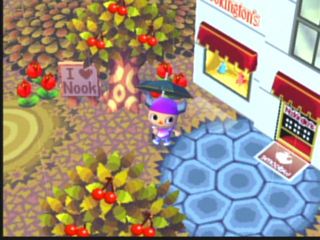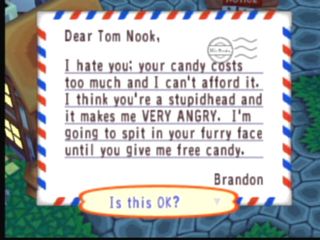Anatomy of A Game Secret (Part Two): Animal Crossing
/Yesterday, I ran the first part of a selection taken from Kristina Drzaic's thesis on game secrets, during which she confessed to having invented a secret which has become part of the mythology surrounding the Zelda games. Today, she continues with a discussion and comparison to the way secrets operate in and around Animal Crossing. This passage is interesting in part because of the way she brings together an analysis of game mechanics with a discussion of the grassroots fan culture surrounding the game. In case you are wondering, I am finally starting to dig my way out from the term and hope to start making at least some of my own posts again soon.
You will recall in the beginning of this paper that I related my experience with a secret glitch and was toast. I noted at the time that it was simply a fun thing to do in the gamespace. Now that we have the necessary background information on what secrets are and what they do we can finally examine what was fun and meaningful in that interaction. Namely that glitches break the rules of a game allowing the player to remap the space in creative ways.
My experience with glitches in Ocarina is not solitary. A search on youtube.com for "Zelda Ocarina Glitch" yields well over one thousand hits. What is interesting is often users will use the language of design in describing their glitches.
One user 'btermini' writes of their video:
I came upe with this idea after doing my test of super mario 64 cartridge tilting glitch i remebed The Legend of zelda ocarina of time is built of the same engin as in super mario 64. so i did some tests....see for your self
What this user is saying is that he came up with this glitch from experiences with glitches in other games, he tested it out and it worked. Finally he invites players to try out the glitch and enjoy his design. What btermini did then is plan, design, and display his glitch. Other users often talk of authorship in terms of their glitches. User 'Banana555">Banana555' writes:
"**I Found this Glitch by Myself so I dunno if its been found, even though every glitch known to man has been found for OoT lol**
Interestingly many other users chastise him for attempting to claim ownership. User 'rkonbon' replies back:
"yeah, you didnt find this out, this is one of the oldest tricks in the book for OoT anyways."
What this shows is that these users see glitches as something designed by them and not gaming companies. These glitches are described as creative endeavors! For one final example the user 'Nam8Macs' posts "his" glitch the "Zelda Ocarina of Time Super Bounce Glitch" along with credits for editing, camera work, and gameplay. His glitch is not simply a secret game moment but also a production! He writes of his work:
"These Rooms are 100% real and have never before been found! i find it a privalage to be able to show you the secrets of Ocarina of Time =D"
What we can distill from this then is that players, in their engagement of glitches feel a sense of authorship and design control over the way they interact with and subvert the rules of the game. The intention of these gamers is to strive to redesign or warp the gamespace and then claim credit. They are the designers of the glitch. These players make their own secrets.
From Zelda: Ocarina of Time we have seen why players look for secrets and how glitches specifically subvert a space by breaking game rules. We have seen why players can be toast and are a-ok with not winning. What would a game look like that allows and accommodates players to remake a game as they see fit? We have seen that secrets are ways for players to personalize a videogame space and feel a sense of authorship. What happens when playing for secrets and being toast become the focus of play? To explore that let us look at Animal Crossing (2002) a game of secrets.
The premise of Animal Crossing is that the player moves to a village populated by animals with only the clothes on his or her back. A conniving raccoon named Tom Nook swindles the player into buying a house on a loan. The player is told to pay off one's mortgage (eventually) and to do so the player will have to devise ways to make money. Thus Animal Crossing draws on a secret-based form of gameplay in that the player is never told directly what to do in the space or how to make money, rather the game is open for exploration, design of game goals etc. Once a player pays off the house the game keeps going and in fact never ends. As such the player must devise their own game goals and find secrets in order to expand the playability of the game. Animal Crossing offers a variety of gameplay options that serve to significantly change the focus of the game.
Animal Crossing allows one to fundamentally change the space and mood of one's animal village through textual manipulation. For example, as a rule there is a keyword or two added to the end of each animal villager's orations. The cat 'Tangy' might say at one point "I love toast in the morning meow" However, when the player is given the option to change the characters speech a simple substitution of words can completely change the connotations of the previous phrase. For instance Tangy's previous phrase could become "I love toast in the morning idiot" effectively transforming Tangy from a simple cat to an aggressive character. By changing the meaning of a character with the game, the player is allowed to participate in a perceived subversion of game rules. Indeed this textual manipulation is not limited to character speech. Players can post signs, send letters, name the town and engage in other atmospheric manipulations. These mechanics, when used in this manner function like a game glitch. The player can inject nuances of character into the villagers that were not designed in the original game. This is a perfect example of how a game designer can design a secret and a player can take it and subvert it into a new type of game design.
This mode of secret interaction is carried over into the game function that controls the ability to design and modify the walls, floors, clothing and umbrellas of the villagers. This option gives the player the power to decide how the village looks and how the villagers portray themselves, which in turn allows a huge amount of individualization within a game. No Animal Crossing village looks like any other. For instance, gamers Filip and Zvonimir Sola transformed their village into an ethnically Croatian one. They made their animals wear Croatian colors, designed a Croatian flag, and made their animals speak Croatian phases, (certainly a modification the programmers never imagined.) In contrast, gamers Will, Neil, Nic and Dan Secor, in their village "E" caused all the animal villagers to wear naked human clothing. This modification effectively transformed the village into a nudist colony, another unsanctioned alteration within the game. The game itself does not suggest modifications to the game image, rather, it allows the characters the liberty to customize their own villages for their own pleasure. Further, Animal Crossing lacks clear game goals and spurs the player to develop their own. For example, here is a game goal design created by a user of the game:
1st: Player goes to the store to buy candy.

2nd: Player lacks the funds to buy candy.

3rd: Player writes a letter to the store expressing anger

4th: With the threats unacknowledged the player organizes a town riot against high candy prices.

While Nook cannot actually be hurt within the gamespace the creation of this gamestory shows that players can manipulate the game and its goals in order to engage in imaginative play. The player uses the ability to send letters to characters as well as the ability to post messages to the Animal Crossing community as a way in which to create their own game within the game. This player subverted the game structure and made their own secret!
Fundamentally, the creation of player made secrets sustains Animal Crossing as a game. In effect, the rule modifications function as self-created attractions. Game play is maintained through the attraction of secrets and the display inherent in perceived subversion. The game has no narrative and no end, instead the player jumps randomly from self-made attraction to attraction. In essence, Animal Crossing is an endless jolt of surprise or (if you will) a video game of player-generated secret attractions.
The franchise of Animal Crossing has since expanded. In 2005 a sequel, Animal Crossing: Wide World was released. While much of the gameplay remained the same in that players can still manipulate the game in a similar way as Wide World allows players across the world to connect and visit each other's villages via a wireless Internet connection. Now instead of the game being limited to four players as it was in the original Animal Crossing, players can play with an endless parade of visitors. One can imagine, however, given the subversive nature of play in Animal Crossing that this results in interesting behavior. Dean Tate admits to booby trapping his village. He remembers "I placed holes all around the village entrance and anyone who came in was caught!...Then I would laugh" There have also been cases of characters inflicting player designed graffiti on each other, chopping down each others trees and plants or in a positive case, engaging players engage in a wide-scale remodeling of a player's village. This behavior is simply the play of the game impressed onto others but what is significant about it is that players are thinking more specifically of their village design in how is interacts with visitors.
Behavior like this is explored by game writer Nadia Oxford in the article "Secret Lives: Beneath the Surface of Animal Crossing." In this article she chronicles her adventures in visiting the animal villages of a friends and documents the way they interacted with her. Of her first visit Oxford writes:
As soon as I entered the town, Friend No. 1 made his presence known by running tight circles around me while wearing a ninja mask...so I was wary until No. 1 calmed down and gave me a master sword, claiming it to be an idol from the original Church of Hyrule. We headed back to his house. He handed me plenty of other presents on the way, possibly to distract me from the state of his property, which might've been regarded by some as a call for help. Weeds and smashed fruit dotted the grass, and unfilled trenches blocked bridges.... It was time to leave. No. 1 urged me to stay a little longer and pray for prosperity and fertility at his master sword idol, but I declined.
Oxford writes of another friend:
Taking advantage of Animal Crossing's boundless opportunity for freedom of expression, No. 2 dressed as a male and spent a good part of my visit hitting on me. A sprite's orientation is their own business, but when a male who's actually a female makes a pass at you, you can't help but feel confused.
And finally:
Things were off to a great start when No. 3 met me at the town gate and began watering me. Apparently, I "needed nutrients." She then bestowed an owl clock on me, though whether through generosity or as a part of my newly prescribed diet, I'm still not sure.
What all these interactions between Oxford and her friends show is that if we look at the behavior of each friend (the friend who ran circles and urged her to pray, the friend who hit on her, and the friend who watered her) each player put on a show for their visitor assuming distinctive behavior and exchanging text which effectively shaped the way their town was viewed. In Wide World players build off the secrets they design and create a gameplay experience for another player.
As a game of secrets, Animal Crossing allows for the kind of play behavior that players strive for in their play with secrets and cheats. Warren Robinette wrote that his videogame secret in Adventure allows for players to reach the game's real conclusion: his name, his easter egg. Secrets today are about players reaching their own conclusion by designing and implementing their own secrets in a gamespace. Players have gained the ability to have some say into the nature of a given game design. Secrets then, while originally a place for designers to play with their designs has now become a place where players can create their own game within a larger gamespace. With the advent of online gaming across all technological platforms the manipulation of secrets has turned into a way for players to design for other players. Secrets have become player-generated game moments shared with other players the world over.


























